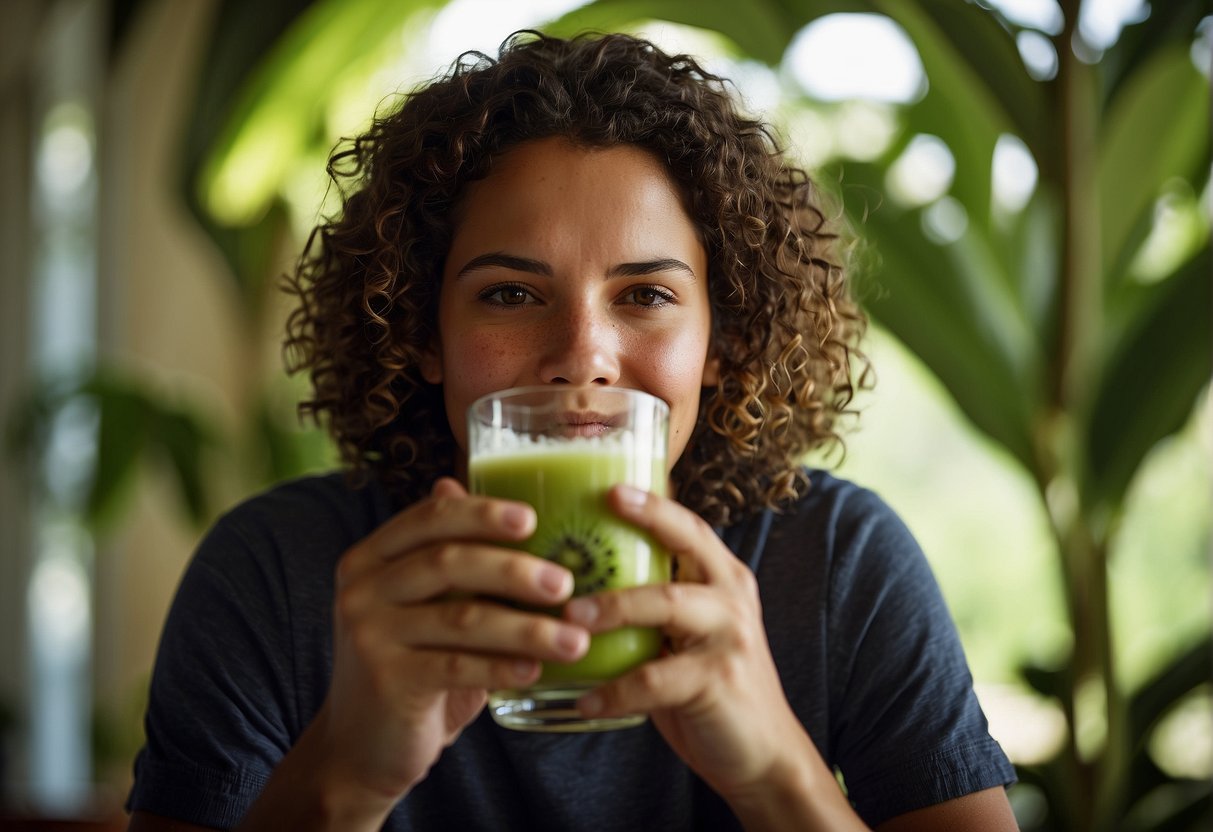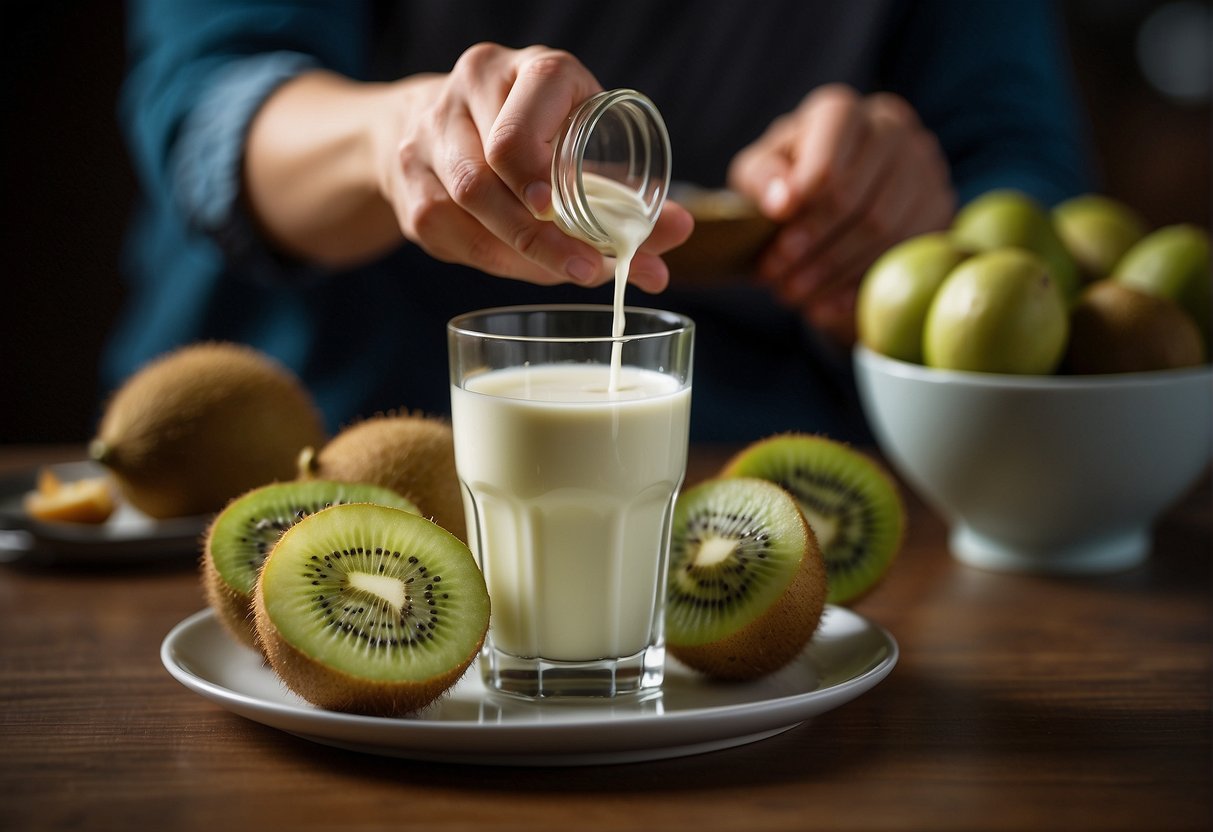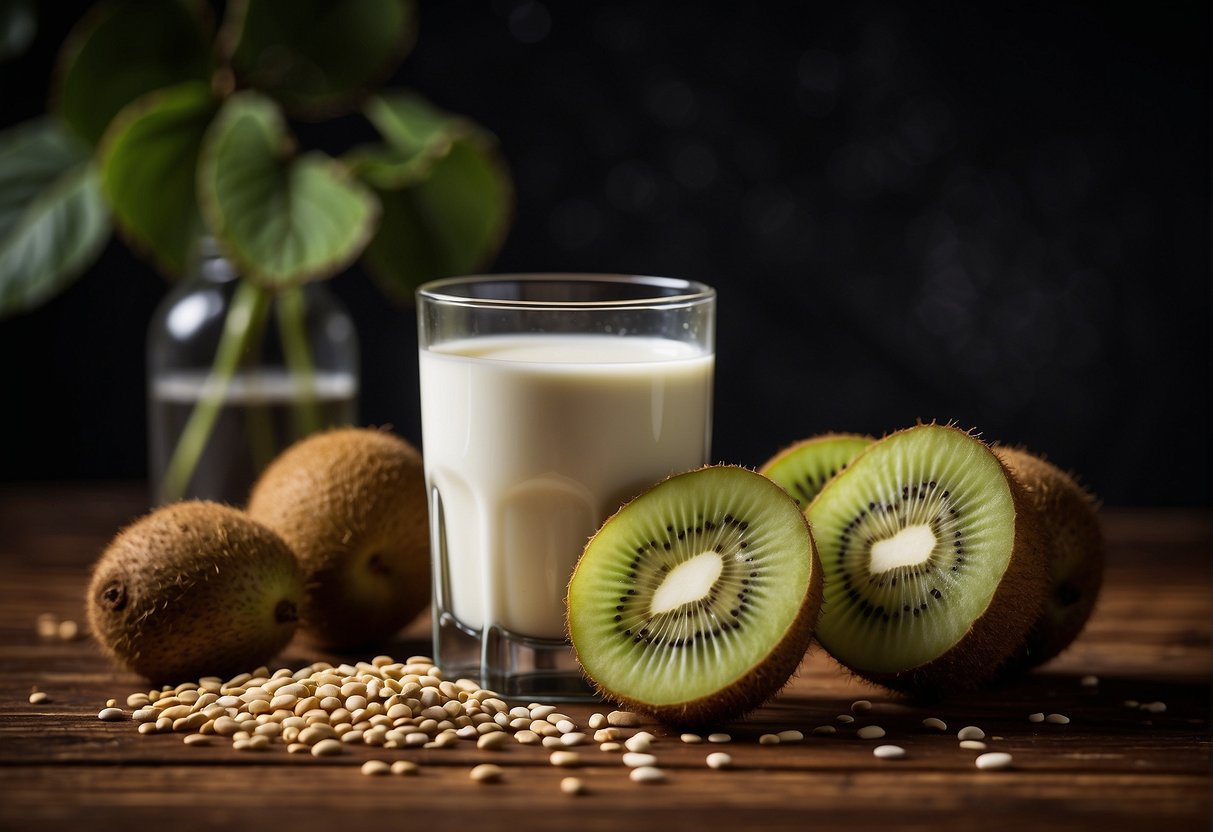Health Benefits of Combining Kiwi and Milk
When I toss kiwi into my milkshake or breakfast bowl, I’m not just after the tropical tang. Kiwis bring in a vitamin C punch, important for my immune support and skin health. This fruit is an antioxidant powerhouse, which means it helps combat oxidative stress and keeps me feeling rejuvenated.
Milk, on the other hand, is a trusty source of calcium, vital for my bone health, and also offers protein which is essential for muscle repair. Now, when I balance the creamy goodness of milk with kiwi’s zing, I get a combo that supports my heart health thanks to the fiber and potassium-packed into the little green fruit.
Despite online chatter, I’ve found no trouble with mixing kiwi and milk; my digestion runs smoothly, probably due to the fiber content in the kiwi. However, if you’re sensitive to lactose, be sure to opt for lactose-free milk to enjoy this mix without any digestive upset.

Here’s how I see the combo stacking up:
- Vitamin C from Kiwi: Boosts my immune system.
- Calcium from Milk: Keeps my bones strong.
- Antioxidants from Kiwi: Fight against free radicals.
- Protein from Milk: Helps with muscle building and repair.
- Fiber from Kiwi: Aids in digestion and heart health.
I make sure to eat the kiwi’s skin too, as that’s where much of the fiber is. It might sound odd, but it’s totally edible and I swear by its benefits for my gut health. This fruity, creamy combo has become a staple in my diet for an energizing and nutritious boost.
Potential Risks and Considerations

When I mix kiwi with milk, I think about potential health implications that can arise. My focus is on allergic reactions, enzyme interactions, and how these might affect digestion and nutrient absorption.
Allergic Reactions and Intolerances
Kiwi:
- Allergy: Allergic reactions to kiwi may range from mild oral allergy syndrome to severe anaphylactic reactions. Individuals who have a known allergy to kiwi should be cautious.
- Oral Allergy Syndrome (OAS): Symptoms include itching or tingling in the mouth. It’s generally not severe, but disconcerting nonetheless.
Milk:
- Lactose Intolerance: Consuming milk can result in bloating, diarrhea, and discomfort if I am lactose intolerant.
- Allergy: Unlike intolerance, a milk allergy can trigger an immune response, leading to more serious symptoms.
Nutritional Absorption and Interactions
- Actinidin: This enzyme in kiwi can affect protein digestion, potentially causing milk proteins to break down. It may lead to milk coagulation, altering the expected digestive process.
Nutrient Interactions:
- Iron and Calcium: Kiwi contains vitamin C, which can help my body absorb iron. However, when I drink milk, which is high in calcium, it might compete with iron absorption.
- Protein Absorption: If actinidin impairs protein absorption from milk, I might not gain the full nutritional benefits I’m expecting from my dairy intake.
Best Practices for Consumption

When mixing kiwi with milk for various recipes, I’ve learned that the timing and method can significantly affect both the taste and the health benefits of the final product.
Optimal Timing and Combinations
I find it’s best to consume milk and kiwi separately to avoid any potential reaction between the two. Kiwi contains an enzyme called actinidain which can cause milk to coagulate, altering the texture and potentially leading to a less pleasant eating experience. For a safer bet, I like to wait at least a couple of hours after having kiwi before I drink milk. This way, it doesn’t interfere with digestion.
If I’m aiming for combining both kiwis and milk in a recipe like a fruit salad or smoothie, I make sure to use ingredients that can neutralize the enzymatic effect. For instance, adding yogurt, particularly Greek yogurt, which has a thicker consistency and a tangy flavor that complements the sweet-tart taste of kiwi, works well in fruit salads or as a smoothie base. This seems to counteract the kiwi enzyme’s effect on milk.
Preparing Kiwi and Milk Recipes
When preparing kiwi and milk desserts, I always go for quality and freshness. Here’s how I do it:
- Smoothies: I blend the kiwi first and then add milk or yoghurt to the mix. I include other fruits high in fiber to balance the flavors and add nutritional value.
- Fruit Salads: I toss chopped kiwi with other fruits, then add a dollop of Greek yogurt on top for a creamy texture.
- Desserts: If the recipe calls for milk, I use it sparingly and often in combination with thicker agents like condensed milk or cream to stabilize the mixture and maintain a desirable consistency.
By following these tips, not only do I preserve the flavor and texture of the kiwi, but I also get the added health benefits of the milk or yogurt I use, like essential protein and fiber. It’s all about the balance and preparation!
Culinary Ideas and Inspiration

When I think of combining kiwi and milk, my mind naturally drifts towards smoothies. There’s something about the sweet yet slightly tart flavor of kiwi that blends so well with the creamy richness of milk. I love tossing a couple of kiwis into a blender, adding some milk (I prefer almond or soy milk for a nuttier taste), a dash of sugar or honey for that extra sweetness, and giving it all a whirl. It’s a refreshing and lively drink, perfect for breakfast or a midday pick-me-up.
Fruit salads present another great opportunity to enjoy kiwi and milk together. I dice up kiwis along with other fruits – a bit of mango for sweetness and some berries for tartness – then drizzle a bit of sweetened condensed milk right before serving. It’s a quick, easy treat that’s both refreshingly juicy and decadently creamy.
For a dessert option, I’ve experimented with kiwi puree in my yogurt. I layer Greek yogurt (its thickness works wonders), kiwi slices, and a sprinkle of granola for some crunch. Alternatively, a dollop of whipped cream topped with sliced kiwi makes for a gorgeous, simple garnish that’ll impress anyone.
Remember, kiwis carry an enzyme called actinidain, which can curdle dairy, so if you’re planning to let your kiwi-milk creation sit for a while, it might not hold up. Think fresh, serve immediately, and you’ll be fine. Nothing beats the indulgence of ripe kiwi and the comforting blanket of milk in whatever culinary adventure you choose to embark on!
Frequently Asked Questions

In this section, I’ll quickly address some of the common curiosities about mixing kiwi with dairy products, particularly milk.
What are the benefits of having milk in combination with kiwi?
Kiwi and milk together can serve as a nutrient-packed snack. I’ve learned that kiwis are a great source of vitamins and milk is rich in calcium, so this combination might offer a healthy balance of nutrients.
Can you make a smoothie using kiwi and milk, and is it safe?
Yes, you can make a smoothie with kiwi and milk, and it’s generally safe for most people. However, it’s wise to keep in mind that kiwi contains enzymes that can break down dairy elements, which might lead to issues in certain cases, especially for those with sensitivities.
Is there any truth to milk turning bitter after adding kiwi?
Kiwi has an enzyme called actinidin which can break down proteins in milk, potentially causing a slight bitterness or curdling. It’s interesting that some people taste the bitterness more than others.
How much time should I wait before consuming milk after I’ve had acidic fruits like oranges?
I typically wait about 20 to 30 minutes. This gives enough time for the acidity in the fruit to settle so that there isn’t an unwanted reaction with the milk.
Is it typically safe to mix dairy products like yogurt with kiwi?
Yes, it is typically safe. In fact, yogurt often contains active cultures that are beneficial, and adding kiwi can be a tasty way to get some extra nutrition.
Does kiwi actually enhance the flavor when mixed into milk-based drinks?
Many people find that kiwi adds a delicious, tangy twist to milk-based drinks. It’s a personal preference, really. The unique flavor of kiwi can enhance the taste of these beverages for those who enjoy a combination of sweet and tart.
